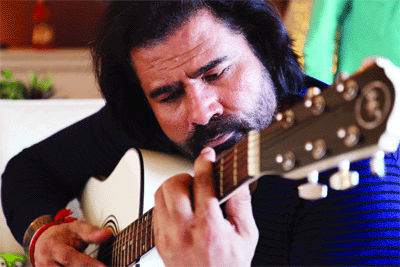Shafqat Amanat Ali, the ninth generation musician from the Patiala gharana, has recreated his father’s ghazal in his latest album. He talks to Karan Bhardwaj about his ancestors challenging every norm in classical music and his effort in carrying forward the family legacy
You have come up with an album after a gap of five years. What took you so longIJ
Actually my platter was full. I was touring to different nations and making music simultaneously. Then there were songs in Hindi movies. And doing an album is a tough task for me since I have to meet a lot of expectations. But I realised that people who love my music were actually getting frustrated. Three years ago, things began to fall in place and I finally managed time to work on a private album. I composed tunes for some old poetry of masters. The album is called Muh Dikhai (Times Music). It includes a couple of sufi tracks by Hazrat Amir Khusrau and professor Mohan Singh, a semi-classical track, a ghazal which was originally composed by my father Ustad Amanat Ali Khan sahib. There are also melodious love songs, which traverse all genres from pop to rock and ballad.
Music has healing powers. How do you think your music has affected peopleIJ
My life is all about music. I was raised in an atmosphere where music was the only constant inspiration. Music influences everyone in varying degrees. During my concert in US, a lady walked up to me and said, ‘You saved my life.’ I was taken aback. She explained that she was wanting to commit suicide but my songs inspired her to change her mind. That is the kind of impact music has on our life. For me, it is everything.
Music often connects one to the Supreme self. Having learnt music from the masters and practised its pure form for years, did you experience moments when it connected you to the SupremeIJ
Music has enormous power to make you realise everything about life, death, spirituality and God. There have been moments in my life when I’m crying and singing non-stop. I remember when I first experienced divinity. I was 19. I was doing riyaaz for hours and just couldn’t stop. It was so full of joy and peace that tears started rolling down my cheeks but I kept rehearsing. That was the moment when I felt my soul was connected to some divine power. I believe that there’s some power that helps you gain this moment of peace and satisfaction. I still break down many a times.
Personally, I’m inclined towards spirituality in life. There is a dargah, some 440 kms from Karachi called Sevan, which I used to visit regularly in my childhood days. The sufi practitioners keep singing qawwali and other devotional music. So I have grown up on that kind of music. In India, I try to visit Ajmer Sharif whenever it is possible.
How comfortable are you doing a sit-down mehfilIJ
I do not sing in sit-down mehfils generally. People may think that I’m arrogant but the fact of the matter is that I have my own terms and conditions for my performances. I perform for people who fulfill those conditions. Most people invite me because they want to seek attention or show off in society. If they are really interested in pure classical music or patronising it with mehfils, then there are enough talented musicians around who can recreate such mehfils. But they insist on my name and want to use it as a benchmark in their functions. I only go and perform if I find the intentions correct. As far as my mehfils are concerned, I haven’t done any for a very long time.
You are an exponent of Patiala gharana that boasts of many generations of classical musicians. Was there any conflict within the family for embracing modern musicIJ
We are as much rooted to our gharana as we are adapting to modern music. As musicians, we have been embracing modern music. Nobody in my family objected to my singing pop or any other genre. In fact, musicians from Patiala gharana have time and again experimented fearlessly. My father sang ghazals when it was not the taste of classical artistes. He was in fact criticised for that. Many classical vocalists were shocked and surprised when we sang Khayal, which again was a bold step for Dhrupad vocalists. So I am just carrying forward that legacy. The next generation is also being trained accordingly. I can sing everything but rap. It’s something that I cannot do.
Who were you trained byIJ
My first tutor was my grandfather Akhtar Hussain. I started learning classical music from him at the age of three or four. After I would finish my session with him, I would rehearse in front of my grandmother Hadayat Begum. She played a constructive role in my riyaaz and in keeping me disciplined. She would give me a whack if I would go wrong. I also learnt a lot from my uncles, sisters and aunts. We were constantly given feedback on our singing or riyaaz which continued for seven to eight hours per day or basically anytime we were not in school. Everyone in the family knew music so anyone who would pass by and hear me doing riyaaz would correct me if I was going wrong or attempting something difficult.
How has Bollywood contributed to your successIJ
Bollywood has helped me in reaching out to more people. Majority of the audience do not listen to classical or private albums as they are more into film music. I have connected to such people. Today, I can say that Indian fans have given a lot of respect and recognition for my work. India is like my second home. Whenever I come here, I feel like I have come to meet my own people. That’s perhaps the reason why I come here more often.
























